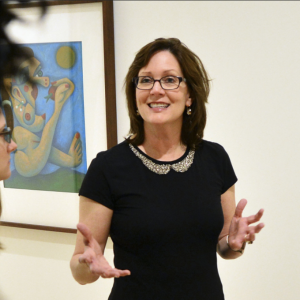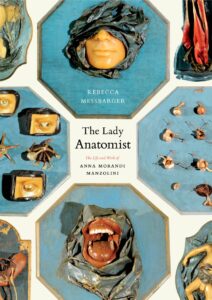The research of Rebecca Messbarger, professor of Italian in the Department of Romance Languages and Literatures in Arts & Sciences, spans many disciplines.
Messbarger specializes in the Italian Enlightenment, in particular the intersections of anatomy and art, medicine and religion, and the shifting roles of women in civic and academic life during the age. Her research examines the impact of these developments on public health. Her current project explores the Italian Enlightenment, or Illuminismo, within a unique framework: that of the gallows, which Messbarger says shaped major political, religious, aesthetic, and medico-scientific reforms across the Italian peninsula.
We come to our work because we fell in love with another language and culture. The foreign language classroom is transformative.
Professor Rebecca Messbarger on the joy of language study

In recognition of this project, titled “Ghostly Light: How Criminal Corpses Animated the Italian Enlightenment,” Messbarger was one of 22 American artists and scholars awarded a 2021 Rome Prize fellowship in Renaissance and Early Modern Studies from the American Academy in Rome (AAR). The AAR fellowships are highly competitive and support advanced independent work and research in the arts and humanities.
Messbarger describes her project: “Focusing on four cultural capitals: Bologna (a Papal state), Milan (ruled by the Austrian Habsburgs), Florence (under Grand Duke Peter Leopold), and Naples (Kingdom of the Spanish Bourbons), I aim to show that, notwithstanding their distinct cultural histories and modes of governance, for each, the criminal body was a recurrent touchstone for institutional transformation. In the singular collaborative milieu of scholars and artists at the American Academy, the Rome Prize would allow me to hone what I hope will be a critical new narrative of the Enlightenment Age.”

The Lady Anatomist (University of Chicago Press, 2010), Messbarger’s earlier work, received wide acclaim for its portrayal of Anna Morandi Manzolini (1714-74), a female artist and scientist who became one of the most renowned anatomical sculptors of the Enlightenment. The book was the inspiration of a feature length film on Manzolini that premiered in Germany in November 2019.
Messbarger is co-founder and the first director of the medical humanities program at Washington University. Her research includes exploring representations of the medicalized body in popular 18-century museums as an “enlightened” means to public education, as well as women’s roles in the advancement and dissemination of medical knowledge, and women’s health. Messbarger’s work in these areas has led to many collaborations with physicians and researchers in the School of Medicine.
Related content
Falling in love with another language and culture
Why study medical humanities? Professor Rebecca Messbarger explains.
Rebecca Messbarger – Beyond Boundaries Podcast
Professor Rebecca Messbarger discusses her teaching philosophy and her course, “Art of Medicine,” which she co-teaches with Professor Patricia Olynyk, her colleague at the Sam Fox School of Design & Visual Arts. The course explores the visual arts and medical practice over time.